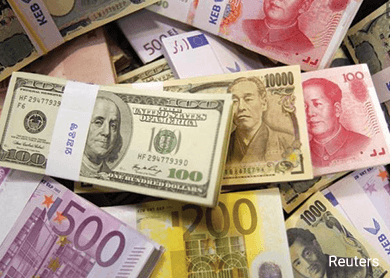
LONDON (Sept 1): The safe-haven yen and the low-yielding euro rose on Tuesday on concerns about China's economy, as investors unwound bets against the two currencies widely used to fund positions in riskier assets.
Speculators and investors have sold low-yielding currencies to buy higher-yielding ones and shares for better returns, so a worsening outlook for stock markets and the global economy tends to reverse that process.
Surveys of China's manufacturing and services reinforced worries about a sharper economic slowdown with Japan's Nikkei ending nearly 4% lower and European stocks all trading in the red.
The dollar fell 0.6% to 120.50 yen, having retreated from a peak of 121.76 yen set late last week. The euro rose 1% to $1.1315, extending its recovery from last week's one-week low of $1.1156.
"Concerns about China are a key drive in currency markets and the PMIs were weaker and not good for overall risk sentiment," said Yujiro Goto, currency strategist at Nomura. "The dollar was buoyed by month-end flows and that seems to have ebbed."
With China moving to clamp down on speculation in the currency forwards market, analysts expect markets to stabilise in coming days. That in turn could see the focus return to U.S. data, including a jobs and wages report due on Friday.
Doubts over whether the Federal Reserve will raise interest rates this month in the context of persistent market turbulence have weighed on the dollar in recent weeks.
But comments from the U.S. central bank's Vice Chairman Stanley Fischer last week suggested an interest rate hike in September was still an option.
"Fischer suggested the Fed will still be watching market sentiment and incoming data over the next two weeks, which puts even more emphasis on Friday's payrolls report," BNP Paribas analysts said in a note.
BNP expects an above-consensus 230,000 increase in jobs and a steady unemployment rate of 5.3%. While that would not be enough to force a September hike, there was scope for the U.S. bond yield curve to turn more dollar supportive.
Later on Tuesday, investors will turn their focus to a survey of U.S. manufacturing activity.
The Australian dollar was flat at $0.7110, after the Reserve Bank of Australia kept interest rates unchanged. The Aussie had set a 6 1/2-year low of $0.7044 late last month, reflecting concerns about the Chinese economy.